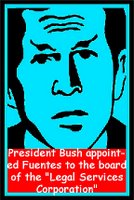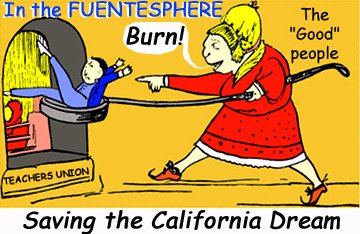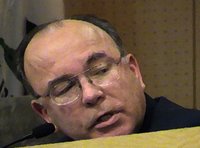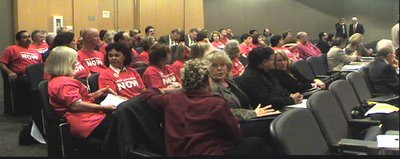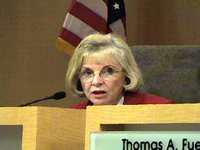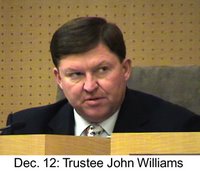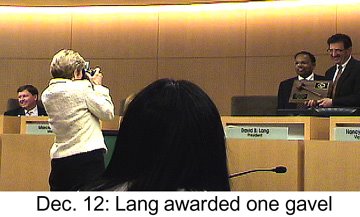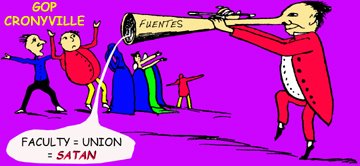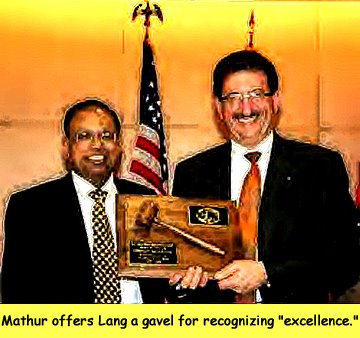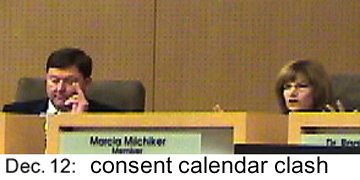 Transcript from the Dec. 12 board meeting (edited; italics by Chunk):
Transcript from the Dec. 12 board meeting (edited; italics by Chunk):
INVOCATION [Apparently, the last one]:
TRUSTEE DON WAGNER: Lord our God, as we meet in this season of Advent…be present with us here tonight. Move within us and grant to us a resolve and powerful direction to do Your will….
…..
 PUBLIC COMMENTS:
MARY WILLIAMS [with apparent near consternation]:
PUBLIC COMMENTS:
MARY WILLIAMS [with apparent near consternation]: …I wasn’t going to say anything tonight, and then I looked around at this crowd of dedicated, hard-working classified employees…These individuals have believed sincerely that you are interested in fairly negotiating with us and in coming up with a contract that was acceptable to both sides. We feel we’ve bent over backwards … to bring this to closure and we understand that you’re just not comfortable moving there. I tried to explain to my landlord—he wanted another hundred dollars a month, and I’m not comfortable with that, and he didn’t care…We just want a fair contract, and we wanted it six months ago, and we certainly deserve it now. Thank you. (Applause.)
…..
TRUSTEE REPORTS:
TRUSTEE NANCY PADBERG: I just want to say to the classified staff that we’re working very hard to try to come to some resolution [of contract negotiations], and while I’m wearing red for the holidays, it’s also supportive of you.
.....
THE [YEARLY] ORGANIZATIONAL MEETING:
TRUSTEE BILL JAY: I would like to nominate the present board leadership for a repeat performance next year. That means Mr. David Lang nominated as President, Mrs. Nancy Padberg nominated as Vice President, and Mr. Tom Fuentes nominated as Clerk… [Nominations are closed. These three win unanimously.]
.....
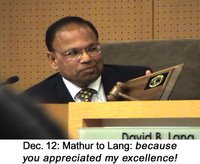 CHANCELLOR RAGHU MATHUR: …I would like to recognize our board president, David Lang…President Lang, … you have been consistently fair and respectful of all people, including me ...You have been genuinely interested in team building…You are always willing to recognize excellence and promote best practices in all of our transactions and in our service to students. Therefore, on behalf of the district faculty, the staff, administrators, managers, the students, and the taxpayers, it is indeed my privilege to thank you from the bottom of our hearts for your wonderful leadership…We present this plaque to you. [Tracy takes a snap. Notoriously, Lang’s was the swing vote in the board action, of June ’05, to renew Mathur’s contract.]
.....
CHANCELLOR RAGHU MATHUR: …I would like to recognize our board president, David Lang…President Lang, … you have been consistently fair and respectful of all people, including me ...You have been genuinely interested in team building…You are always willing to recognize excellence and promote best practices in all of our transactions and in our service to students. Therefore, on behalf of the district faculty, the staff, administrators, managers, the students, and the taxpayers, it is indeed my privilege to thank you from the bottom of our hearts for your wonderful leadership…We present this plaque to you. [Tracy takes a snap. Notoriously, Lang’s was the swing vote in the board action, of June ’05, to renew Mathur’s contract.]
..... TRUSTEE JOHN WILLIAMS: I’d like to address the issue of the removal of the invocation. Would you like to wait until the vote, or should I present my thoughts now?—
TRUSTEE DAVE LANG: This would be the time to comment on that. [Williams makes a motion, but it is not seconded, and it apparently dies. Unless I am very much mistaken, the board approves a new “agenda format” that excludes an invocation.]
.....
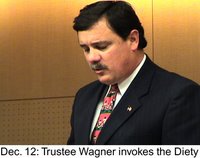
TRUSTEE LANG: I would like to make a few comments…I recognize the seriousness of the challenges and the opportunities that we face together to represent our communities…I believe that this board as a group has much to be proud of…Our district employs, in my opinion, some of the best faculty and staff in the state, and compensates them accordingly. I believe we have strengthened our communications among us, and are beginning to concentrate more of our efforts on significant issues…We’ve established district goals and board goals. We’re currently conducting a study to update the district’s educational and facilities master plan. These are all worthy and laudable accomplishments, but, of course, we’ll not be allowed to rest on our laurels. … We’ve got significant work to do to address and discuss recommendations that have been raised by the accreditation teams. We’ve got tremendous challenges ahead associated with balancing our current programmatic needs of the colleges with both the current and long-term infrastructure needs for both colleges and ATEP...I look forward to working with all of you in the year ahead and I thank all of you again for your support.
.....
 THE REGULAR MEETING RECONVENES:
THE “CONSENT CALENDAR” SHOOTOUT:
THE REGULAR MEETING RECONVENES:
THE “CONSENT CALENDAR” SHOOTOUT:
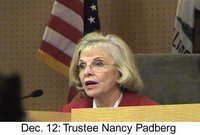 PADBERG:
PADBERG: I want to pull items from the consent calendar…Items 12 to 35 all deal with the [construction of the] IVC theater…. [Consent calendar items are approved in one fell swoop, without discussion. Pulling an item from the CC means devoting meeting time to discussing it and then voting on it. In the past, when a trustee has asked to pull items from the CC, that request has always been honored. That, now, board members urge the chair not to honor such a request is curious.]
…..
WILLIAMS: Well, I don’t know why we need to pull half the consent calendar. The board should have some discretion on honoring these requests. I think we need to move on with the people’s business here. To pull thirty items from the consent calendar—I’d like to know if fellow trustees made telephone calls to staff to have their questions answered. The chair has discretion here….My question is, why are we pulling approximately thirty items from the consent calendar, when trustees have had at least a week to ask questions of staff if they had any questions?
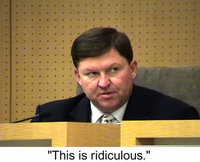
PADBERG: It is within the discretion of any board member to pull items off the consent calendar. These are significant items having to do with the construction of a multi-million dollar building at IVC. [Putting these items on the consent calendar, as the chancellor has done] I don’t think does good service to the public who watches this meeting. They need to know how millions of dollars are being spent…This [construction project, including the selection of contractors] should probably not have [been placed] on the consent calendar.
LANG: …I happen to agree with Trustee Williams…In my view, there is adequate time for board members to ask the Chancellor and staff members about items that are on the consent calendar….[One might speculate that Padberg is not comfortable phoning the Chancellor, an individual who, reportedly, show holds in very low regard.]
…..
WILLIAMS: …What I think is unnecessary in doing the business of the people is approving over and over the expenditure of the same dollars…I don’t think the viewing audience wants to hear us debate the contractors [for this project]…I would ask the board chair to use some discretion as to whether or not we should pull 29 items from the consent calendar.
PADBERG: [Though the expenditures have already been approved,] the contractor selections have not been [approved by the board]. We’re talking about [hundreds of thousands and even millions of dollars]. I‘m just looking for some comment from the Chancellor … about the selection [of contractors] process—I understand they’re all the low bidder. However, we’re talking about millions of dollars, and we need to let the public know that.
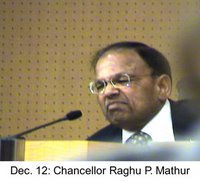 [At this point, Chancellor Mathur explains the process whereby contractors are selected. It would appear that this is all that Padberg wanted in the first place. Mathur explains the oversight involved. Mathur closes by inviting trustees to call him if they have any questions.]
…..
[At this point, Chancellor Mathur explains the process whereby contractors are selected. It would appear that this is all that Padberg wanted in the first place. Mathur explains the oversight involved. Mathur closes by inviting trustees to call him if they have any questions.]
….. WAGNER: …I am urging you [i.e., President Lang] to exercise your discretion to move this meeting along…[W]e’ve had all this information in front of us for over a week…and any member of the public who’s interested…can…come on down to the district [to get this information]…Everything here has been done in public, in a completely above-board manner, and any trustee who has a question about a particular sub-contract is free to, and is encouraged by our Chancellor, to contact administration…Let’s make a decision and move on.
TRUSTEE MARCIA MILCHIKER: I have to weigh in on the side of Trustee Padberg…[These items add up to over] $18 million…I remember in the past, that the board has been much more hands-on [about the construction of buildings], and every step of the way…we would look [in] every nook and cranny; we would have monthly meetings [about] how the building was progressing. And this is the meeting to conduct the business of the [district]…we’re not… [here] to speed through, to make sure [we]… get out of here by 9:00. Now, we have had this information in front of us for a week, but if there are questions to be asked…a trustee has the ability as an elected official—a million people elect us—[to handle?] the fiduciary responsibilities of the taxpayers to ask questions at the board meeting. So if there are questions, I think they should be answered at the board meeting.
PADBERG: …The Brown Act does not allow us to get our questions answered in private and to conduct the business of this board in private…[All that] I want is some comment from the Chancellor about the process. When you’re spending $18 million to do it in a ‘slam-dunk’, it’s just disgraceful.
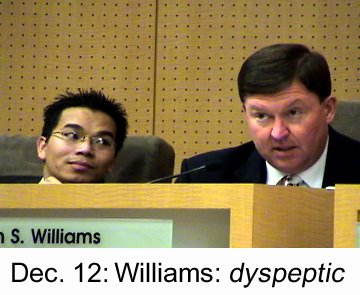 WILLIAMS [clearly peeved]: …There’s absolutely nothing [in the Brown Act] to prevent a board member from doing his or her homework and preparing for a board meeting by reading the agenda, and if you have a question, ask staff….[Williams turns to Mathur:] I have to ask the Chancellor: did any board member contact you about questions about these agenda items? [Mathur answers: “no one.” But then Lang reminds Mathur that Lang had called to ask him about some agenda items.] Yet trustees are saying they want to hear a presentation from you, but they didn’t ask you in advance? …So this is kind of a surprise on the chancellor to all of a sudden come in unprepared and to make comments about numerous agenda items. This is not the way the people’s business was intended to be conducted…This is ridiculous.
WILLIAMS [clearly peeved]: …There’s absolutely nothing [in the Brown Act] to prevent a board member from doing his or her homework and preparing for a board meeting by reading the agenda, and if you have a question, ask staff….[Williams turns to Mathur:] I have to ask the Chancellor: did any board member contact you about questions about these agenda items? [Mathur answers: “no one.” But then Lang reminds Mathur that Lang had called to ask him about some agenda items.] Yet trustees are saying they want to hear a presentation from you, but they didn’t ask you in advance? …So this is kind of a surprise on the chancellor to all of a sudden come in unprepared and to make comments about numerous agenda items. This is not the way the people’s business was intended to be conducted…This is ridiculous.
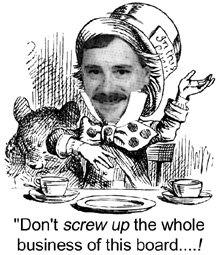 WAGNER [with Wagnerian peevishness]: …What’s happened here, and what a majority of the board I think objects to, is a wholesale polling of every item….The issue here is not [that?] Trustee Padberg has a particular question with issues, it’s she’s got a philosophical objection to dealing with these on the consent calendar. But with all due respect to Trustee Padberg, this board feels differently, and a majority agrees that it can be handled on a consent calendar. Therefore I say to you…if you have questions, address them to administration in the proper channels in the proper time, and if you don’t get your questions answered about a particular agenda item, raise it here. Don’t screw up the whole business of this board when you are clearly in a minority. The board has voted and has determined to handle these on a consent calendar.
WAGNER [with Wagnerian peevishness]: …What’s happened here, and what a majority of the board I think objects to, is a wholesale polling of every item….The issue here is not [that?] Trustee Padberg has a particular question with issues, it’s she’s got a philosophical objection to dealing with these on the consent calendar. But with all due respect to Trustee Padberg, this board feels differently, and a majority agrees that it can be handled on a consent calendar. Therefore I say to you…if you have questions, address them to administration in the proper channels in the proper time, and if you don’t get your questions answered about a particular agenda item, raise it here. Don’t screw up the whole business of this board when you are clearly in a minority. The board has voted and has determined to handle these on a consent calendar.
PADBERG: There has never been a vote about how items are to be placed on the consent calendar, and every single item on the agenda should not be on the agenda unless there’s a staff member prepared to discuss it, consent calendar or not…We’ve debated for probably twenty minutes whether the item should be pulled. We could have been through talking about the item….
WILLIAMS: As the maker of the motion, I don’t accept any changes in my motion…and my motion was to approve the consent calendar.
LANG: …I want to have a brief recess while I consult with legal counsel about this matter…
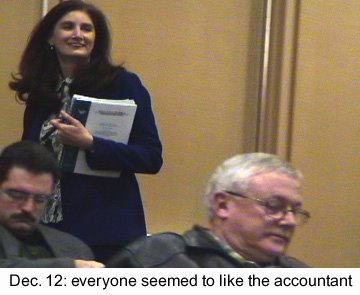 [After a few minutes:]
I have decided that it is appropriate for us to follow our past practice tonight and respect those trustees that have removed items from the consent calendar…Before our next meeting, however, I do intend to consult with district counsel to verify that we [i.e., the majority of trustees] have the authority essentially to approve a consent calendar without having to pull all of the items off in the future. [Lang pushes forward with a vote on the motion to accept the consent calendar—with Padberg’s items removed as per her request. Williams and Wagner dislike the decision. “I can’t support that,” says Williams. The Board votes with their electronic gizmos.]
[The student trustee explains that, somehow, his vote is not registering with his gizmo.]
[After a few minutes:]
I have decided that it is appropriate for us to follow our past practice tonight and respect those trustees that have removed items from the consent calendar…Before our next meeting, however, I do intend to consult with district counsel to verify that we [i.e., the majority of trustees] have the authority essentially to approve a consent calendar without having to pull all of the items off in the future. [Lang pushes forward with a vote on the motion to accept the consent calendar—with Padberg’s items removed as per her request. Williams and Wagner dislike the decision. “I can’t support that,” says Williams. The Board votes with their electronic gizmos.]
[The student trustee explains that, somehow, his vote is not registering with his gizmo.]
LANG: That does not surprise me based on the way this has gone so far. [Much laughter. Then there is a “re-vote.” Fuentes, Padberg, Lang, and Milchiker vote in the affirmative. Jay, Wagner, and Williams vote in the negative.]
LANG: It passes 4 to 3.
--More (i.e., the debate re the hiring policy) later. --CW
THE "HIRING POLICY" DISCUSSION:
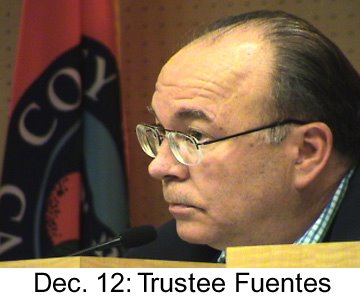 As you know, the Hiring Policy has had quite an interesting history here in the district. (See the Dec. 13 blog for a review.) To make a long story short, two or three years ago, Chancellor Mathur and the Board Majority unilaterally developed and approved a new hiring policy that shifted power and authority away from faculty and toward administration. This occurred despite the law, which plainly requires that such policies be developed “and agreed upon jointly” by the district and faculty. After a coupla years of litigation, it was (conclusively) determined that the law means what it says and, hence, the district’s unilaterally imposed hiring policy was invalid. Thus it came about that a new policy was developed—this time truly jointly—and approved by the faculty (i.e., the academic senates) and the district’s representatives (namely, the Chancellor and Board President Lang).
By Dec. 12, all that remained was board approval. Were the board to reject the new document, the district would be compelled to work with the last hiring policy jointly agreed to (i.e., the 1994 policy). In other words, were the Board to fail to approve the new policy, it would be forced to honor a policy that is even more “faculty friendly.”
Under the circumstances, one might suppose that the new policy would be approved without controversy. But no. Trustee Fuentes objected to some of its elements.
(Technical note: I did not bring enough videotape to the meeting, and I ran out just as Mr. Fuentes began his remarks. I quickly rewound the tape and started videotaping. Evidently, I did not remind far enough, and so I have no tape of the beginning or the end of this discussion. [The district keeps videotapes and broadcasts the meetings twice.])
As you know, the Hiring Policy has had quite an interesting history here in the district. (See the Dec. 13 blog for a review.) To make a long story short, two or three years ago, Chancellor Mathur and the Board Majority unilaterally developed and approved a new hiring policy that shifted power and authority away from faculty and toward administration. This occurred despite the law, which plainly requires that such policies be developed “and agreed upon jointly” by the district and faculty. After a coupla years of litigation, it was (conclusively) determined that the law means what it says and, hence, the district’s unilaterally imposed hiring policy was invalid. Thus it came about that a new policy was developed—this time truly jointly—and approved by the faculty (i.e., the academic senates) and the district’s representatives (namely, the Chancellor and Board President Lang).
By Dec. 12, all that remained was board approval. Were the board to reject the new document, the district would be compelled to work with the last hiring policy jointly agreed to (i.e., the 1994 policy). In other words, were the Board to fail to approve the new policy, it would be forced to honor a policy that is even more “faculty friendly.”
Under the circumstances, one might suppose that the new policy would be approved without controversy. But no. Trustee Fuentes objected to some of its elements.
(Technical note: I did not bring enough videotape to the meeting, and I ran out just as Mr. Fuentes began his remarks. I quickly rewound the tape and started videotaping. Evidently, I did not remind far enough, and so I have no tape of the beginning or the end of this discussion. [The district keeps videotapes and broadcasts the meetings twice.])
FUENTES: [As I recall, Mr. Fuentes began his remarks by noting the composition of the “search committee,” i.e., the group that evaluates applications and then interviews worthy candidates in the hiring process. That committee normally recommends three finalists, who are then interviewed by the President, who makes the final selection. If the committee sends fewer than three names, the President has the power to restart the entire search process. Hence, committee members have a motive to send three when there are three worthy of recommendation. Mr. Fuentes’ objection to the faculty’s choosing four of the seven search committee members flies in the face of that fact and other facts that give to “management” (as he calls it) considerable power and influence in this process.]
…I would like to know how many finalists would the committee forward to the [college] President…[according to this new policy], and What would the President do if the committee forwards less than three finalists? And I’d also like to know, What would the President do if cronyism is involved in the hiring process, and he observes it?
MATHUR: Let me try the first [question], and I’ll defer to the college presidents about some of the other questions. With respect to the committee composition, I understand that the academic senate will be recommending four…faculty, and the college president will be appointing three [members], including the appropriate dean….
FUENTES: So it is, for the record, to be stated that union membership–the academic senate “slash” labor union—appoints four in the selection process, and the management side of the equation, in the minority of three. [Mr. Fuentes displays a look of mild incredulity.]
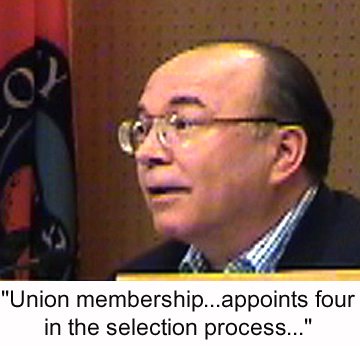 MATHUR: Well, as I stated, the academic senate will be appointing four, and the college president will be appointing three members out of a seven-member committee.
[That wasn’t much help, so Lewis offers a comment:]
MATHUR: Well, as I stated, the academic senate will be appointing four, and the college president will be appointing three members out of a seven-member committee.
[That wasn’t much help, so Lewis offers a comment:]
LEWIS L (faculty union president): As the president of the faculty association “slash” labor union, I just want to specify that the labor union has no role in appointing faculty members in the hiring committee at all—
FUENTES: Are all the senate members not likely members of the labor union?
LEWIS: They may or may not be, but…
FUENTES: [Interrupts:] But they could be.
LEWIS: But they certainly wouldn’t be functioning in that capacity while they [serve on the committee].
WENDY G (IVC Academic Senate Pres.): To add clarification: the Education Code is very clear that hiring policy issues and procedures are between the board and the academic senate, not between the faculty association—
FUENTES: [Interrupts:] How do labor union members separate themselves in—in that. How do you take one hat off and put another hat on, when you go into that meeting?
WENDY: The Ed Code is clear that this is a role of the academic senate and [the] faculty association or the labor union has no role whatsoever in any procedure or provision of the hiring policy.
FUENTES: If the Academic Senate members are members of the labor union, how do you separate that? You
WENDY: That’s another issue, [one] that has nothing to do with hiring policies.
FUENTES: (after a pause): my next question is, Who will write the job description of each faculty vacancy?...
[Deputy Chancellor Gary Poertner is called upon to answer the question. Poertner was on the committee that developed the new policy.]
FUENTES: [This?] faculty hiring committee, dominated by four members of faculty will have a significant review in the process of developing the description of each faculty vacancy?
POERTNER: Yes, it would be the faculty—primarily faculty in the department of the position that’s being hired. They would be the ones who know most about the position and would provide input about what’s needed in its description.
WENDY: [The new policy:] …provides that the college president has the final authority in decision-making on all job descriptions, so the management has the final authority and say on all job descriptions. The faculty simply have input into the process.
FUENTES: Thank you. My next question is, How many finalists would the committee forward to the President, and what would the President do if the committee forwards less than three finalists?
MATHUR: As a general rule, the committee forwards the names of three finalists to the President, and under rare circumstances, the committee may forward less than three, but the President has the option of asking—
That’s where my tape cuts out. As I recall, it is next made clear that the new policy gives to the President the power to insist on three names for final interview (by the President). If the committee then asserts that there are not three candidates worthy of recommendation, then the President has the option of going forward or starting the search from scratch.
Some of Mr. Fuentes’ questions seem to suggest that he has not read the new policy document carefully, and someone suggests that he should study it. Fuentes responds by suggesting that he can’t do that if he does not have the policy “before” him. It is then noted that the policy is indeed before him.
In the end, Mr. Fuentes explains that he cannot “in good conscience” vote for a policy that is biased against “management.”
The new policy is adopted on a 6 to 1 vote.
I left the meeting soon after, but I have been told that the subsequent discussion of a possible required student evaluation of faculty was “interesting.” You might wanna catch that on TV.

 ttention fans of free speech and academic freedom! You really should check out the Fall 2005 edition of the NEA’s higher education journal, “Thought & Action.” (Thought & Action)
ttention fans of free speech and academic freedom! You really should check out the Fall 2005 edition of the NEA’s higher education journal, “Thought & Action.” (Thought & Action) Or, more accurately: the other nine people should be, but aren’t, like that guy.
Or, more accurately: the other nine people should be, but aren’t, like that guy. Unlike some persons I know.
Unlike some persons I know.


